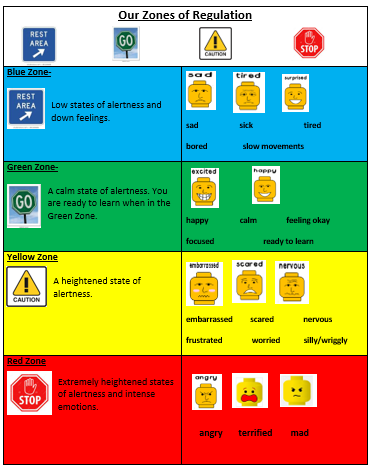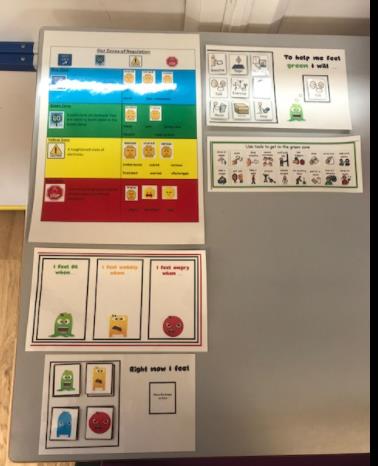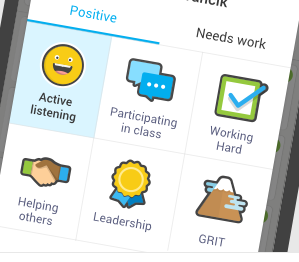Positive Behaviour Policy
Expectations are high and all staff ensure the pupils conduct themselves in the best possible manner.
Behaviour Statement
At Newark Hill, we believe that all children and adults in our school and community are important. We aim to provide an environment where everyone feels valued, happy and secure.
We are committed to enabling all of our pupils to access their education successfully by regulating the conduct of all pupils. We take the behaviour of all the children in school very seriously and have simple school rules for everyone to follow. Our behaviour principles are around our 3 'Golden core values' of having respect, being responsible and having resilience. These 3 core values are referenced several times in the day, whether it be in the classroom, in assemblies, at lunchtimes/break times around the Academy etc.
At our Academy we follow the Zones of regulations-

This program teaches a variety of social-emotional skills to children, starting with early emotional skills and advancing on to self-regulation and navigating social situations. Pupils are taught to co-regulate and then the Zones help lead on to self-regulation.
Here are some skills taught during The Zones of Regulation:
- Identifying your emotions by categorising feelings into four zones
- Self-regulation: Achieving the preferred state of alertness (zone) for a situation. This is all about regulating your body and emotional regulation.
- Identifying triggers: Learning what makes you “tick” and why
- Coping strategies: Various techniques and strategies that help achieve emotional regulation and manage strong emotions
- Size of the problem: Introduces the idea that the size of your reaction should match the size of your problem, how to identify the size of your problem, and strategies for problem-solving.
- Expected behaviour vs unexpected behaviour: This also covers perspective taking and how your behaviour affects the thoughts and feelings of the people around you.
Here is an example of a pupil's individualised Zones of regulation Action board-

This 'Action Board' is used daily by pupils struggling to regulate behaviours and allows staff to support pupils when they are not in the green zone.
The Zones of Regulation uses four colors to help children self-identify how they’re feeling and categorise it based on colour.
These also help children better understand their emotions, sensory needs, and thinking patterns.They learn different strategies to help them cope and manage their emotions based on which colour zone they’re in.
We also use Class DOJO Reward Systems-

We are currently using the Class Dojo reward system to encourage positive behaviour in school. Children can earn Dojo points by demonstrating positive behaviour such as helping others, working hard, being kind to others and making good progress during lessons. However, children can also lose Dojo points for breaking the school rules, including being disrespectful, being off task or hurting others. Every Friday, the child in each class who has earned the most Dojo points for that week receives a special Dojo award certificate in our celebration assembly. There are also incentives for the children to earn as many points as possible over the year, with certificates awarded as the children reach milestones, such as a bronze award for 100 Dojos and a silver award for 200 Dojos.
‘Class Dojo’ is a web based program which allows teachers to track pupil’s positive behaviours easily and efficiently.
We feel this system has improved standards across the school and has encouraged the children to be more aware of their actions.

Kindness Crew-
At Newark Hill Academy we also value kindness and our Kindness crew are vital in promoting and encouraging kindness throughout the school. The crew members chosen had successfully applied for the position and have been phenomenal in introducing Kindness Awards throughout the school, monitoring the use of the kindness and leading assemblies around what it means to be kind. The members will be working closely with the Academy Council members to organise and enthusiastically raise funds for charities, displaying a kind and caring nature to our local community and world.
The Code of Conduct for the Kindness Crew is:
• To look out for lonely people
• Be an extra pair of ears and eyes
• Be happy and smile
• Be kind and helpful
• Suggest games and come up with ideas
• Respect others
• Set a good example
• Be active
• Be encouraging
We hope to expand our crew and inspire kindness in everyone!

The Trust behaviour policy can be found here.
